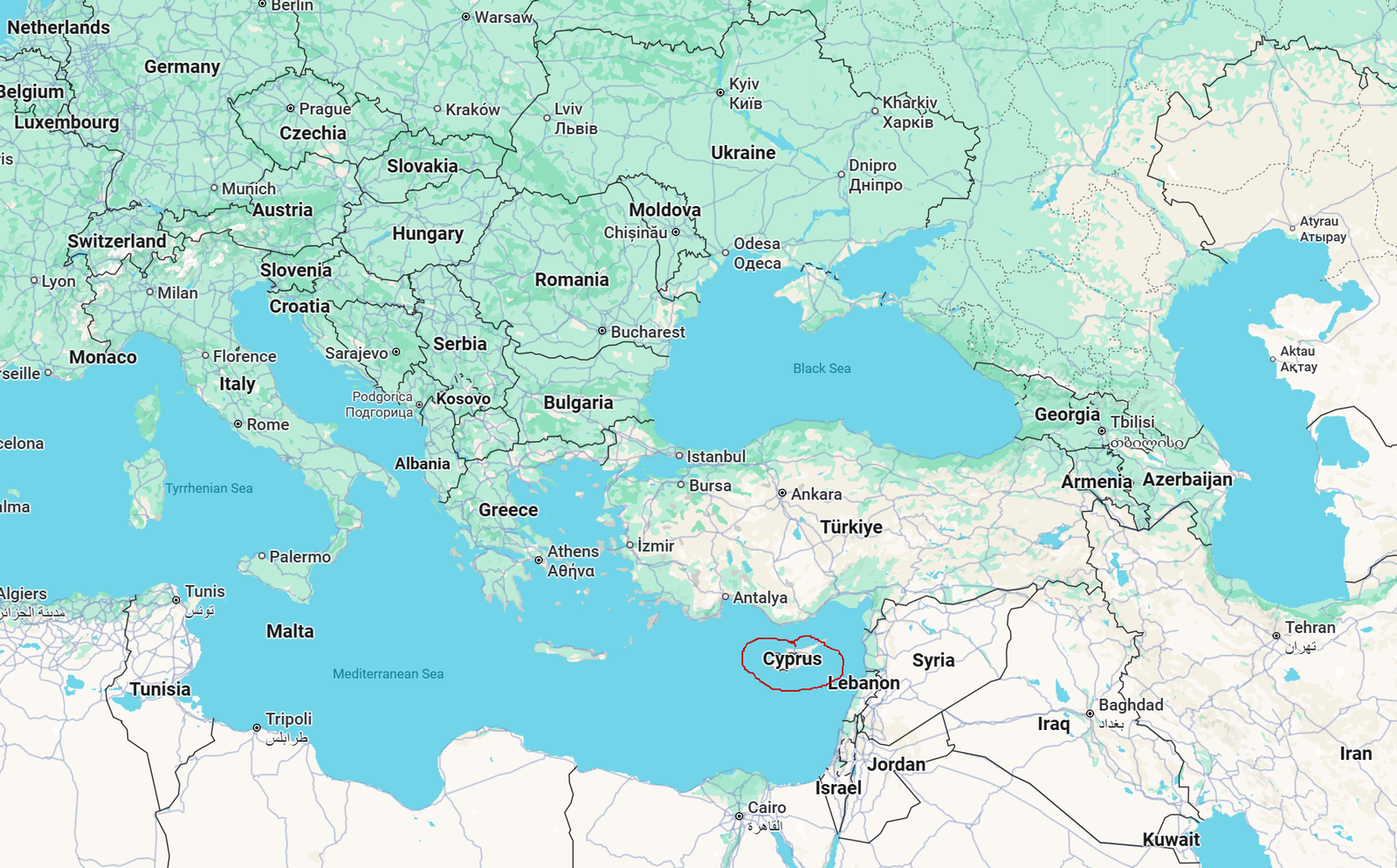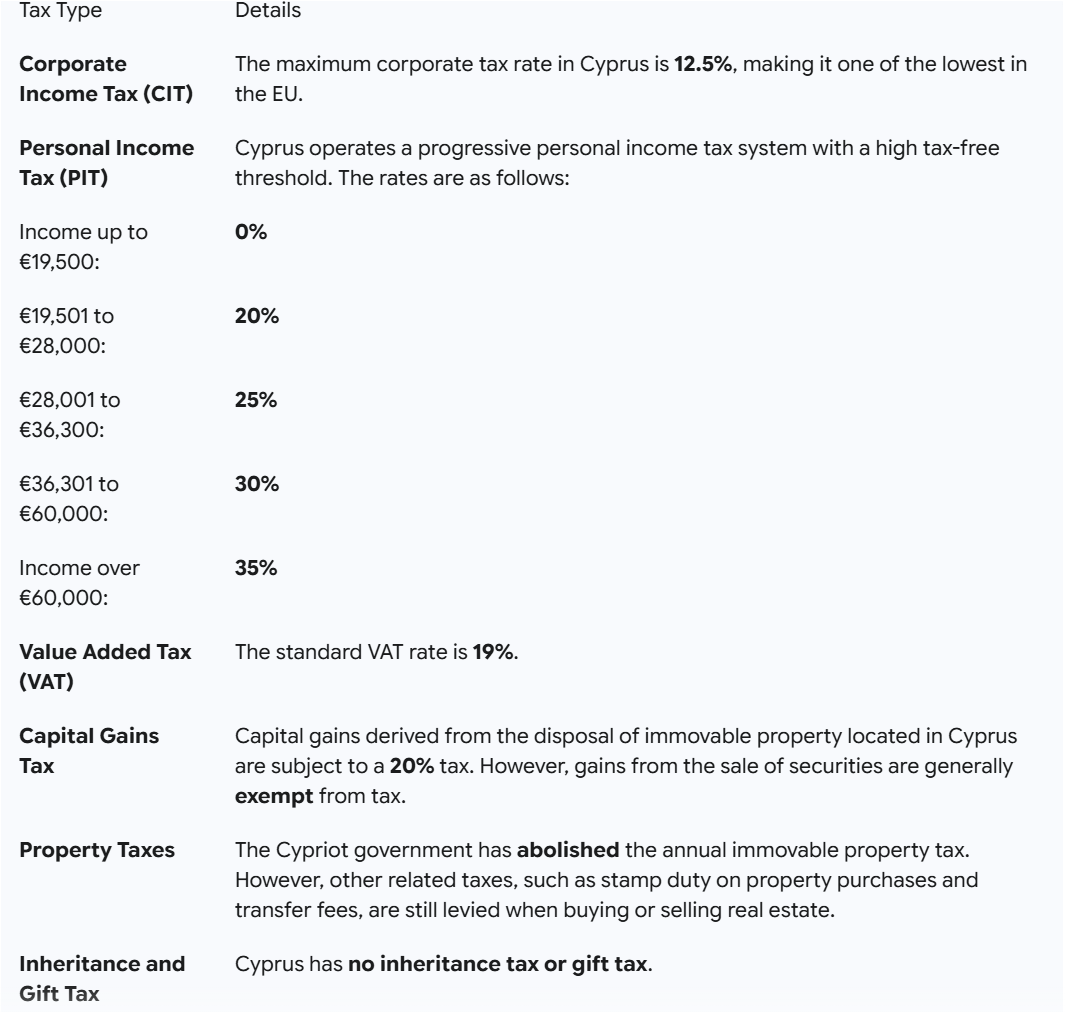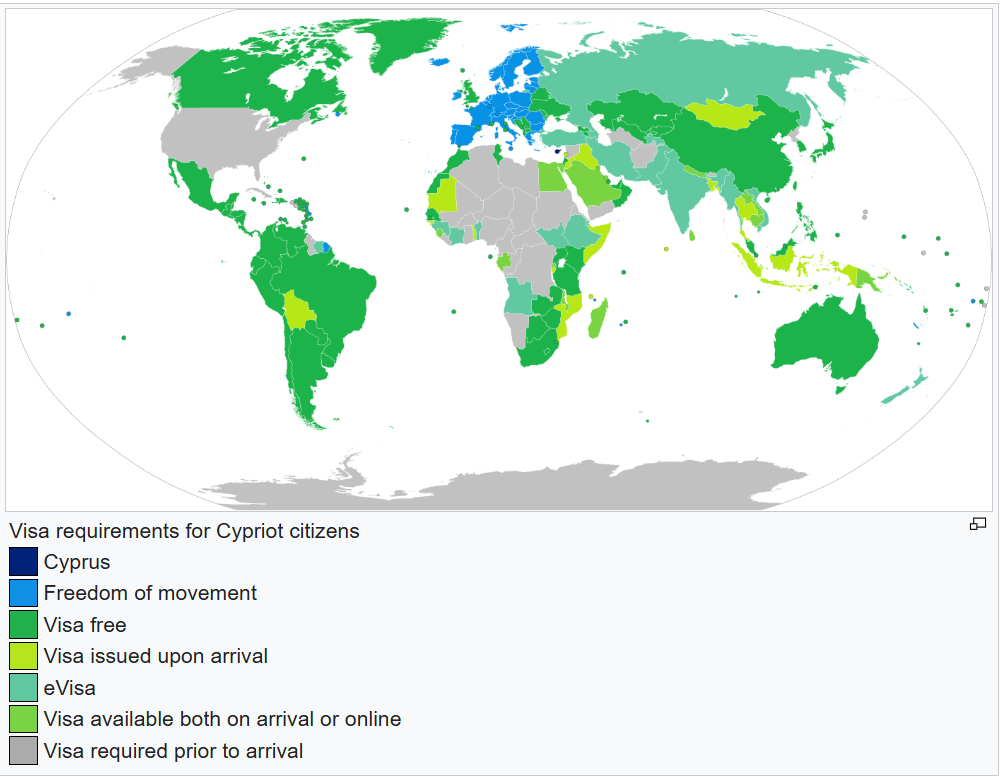How To Get Residency in Cyprus: A Comprehensive Guide
Capital: Nicosia
Population: 923,272 (2022)
Ethnic groups: 98.8% Greek Cypriots
Area: 9,251 km2 (162nd)
Offical Language: Greek & Turkish
Currency: Euro
GDP per Captial (PPP): $65,088 (2025 estimated, 27th)
Human Development Index: 0.913 (2023, 32nd)

Country Profile:
Cyprus is located in the eastern Mediterranean Sea, at the crossroads of Europe and Asia. Geographically, it is situated within Asia, but culturally, it is considered part of Europe. It is the third-largest island in the Mediterranean, with tourism and agriculture serving as the main pillars of its national economy.
Cyprus is currently divided into two political entities: the internationally recognized Greek Cypriot administration in the south and the Turkish Cypriot administration in the north. Our discussion here refers to the internationally recognized Republic of Cyprus in the south.
Currently, Cyprus is a member state of both the European Union (EU) and the Schengen Area. While English is not an official language, its proficiency is high in Cyprus; data shows that 73% of the local population can communicate fluently in English.
Visa & Immigration System:
As a member of the European Union, Cyprus maintains a very open immigration system, offering up to 15 different pathways for residence permits. The main routes are outlined below:
1. Golden Visa (Permanent Residency by Investment):
This is an permanent residency by investment program requiring a minimum investment of €300,000 to directly obtain Cyprus Permanent Residency (PR).
-
Investment Fields: Options include real estate, investment funds, or the acquisition of shares in or operation of a company.
-
Residency Requirement: Golden Visa holders are not required to physically reside in Cyprus to maintain their status; a visit once every two years is sufficient, unless they plan to pursue citizenship.
-
Citizenship Path: If you choose to live in the country and apply for citizenship after eight years, you may liquidate (sell) your investment after successfully obtaining Cypriot nationality.
2. Start-up Visa:
This is a business-related visa that requires you to establish a company in Cyprus with an innovative business plan and sufficient seed funding (typically €10,000 or €20,000).
-
Requirements: The Cyprus Start-up Visa has modest capital investment requirements but high standards for the company’s business status and the applicant’s overall qualifications.
-
Assessment: The Deputy Ministry of Research, Innovation and Digital Policy reviews applications across five dimensions: international market impact, innovation and scalability, competitive advantage, management team, and intellectual property. Securing this visa is highly selective.
3. The Pink Slip (Temporary Residence Permit):
The Temporary Residence Permit is widely known as the Pink Slip due to the color of the physical card. This is a one-year residence card requiring the applicant to demonstrate a stable annual income of no less than €24,000.
-
Income Source: Your income is not strictly limited to passive sources; income from salaries or freelance work can be included. As long as you can sustain yourself in Cyprus without relying on the local economy to generate the required income, you are eligible to apply.
4. The Yellow Slip (EU/EEA Registration Certificate):
The Cyprus Yellow Slip (MEU1) is a registration certificate issued to residents of the EU, EEA, and Switzerland. Unlike the Pink Slip, which is for third-country nationals, Yellow Slip holders are free to live and work in Cyprus.
The Yellow Slip for EU residents is valid for life. For non-EU nationals residing under certain schemes, it is valid for five years and renewable under the original conditions.
5. Digital Nomad Visa:
This visa requires the applicant to be a remote worker with an income exceeding €3,500 per month.
-
Duration & Benefits: It is a temporary residence permit initially valid for one year, renewable for a maximum of two additional years. Visa holders benefit from certain tax advantages, making it popular within the digital nomad community.
-
Quota: The government initially set the annual visa quota at 500. Due to high demand, these slots were often filled quickly, leading the government to increase the quota to 1,000 per year starting in March 2025.
6. Work Visa:
You can apply for a Cyprus Work Visa if you have a local employment contract. Furthermore, foreigners holding an EU Blue Card can also freely live and work in Cyprus.
7. The Cyprus category C permit:
An owner of a foreign-interest company may apply for a Category C Residency Permit if they invest €260,000 in their Cypriot company and can demonstrate that the company’s business activities benefit the economy of Cyprus.
This permit is valid for life, provided that the holder remains the owner of that foreign-interest company.
8. Cyprus category E permit:
A foreign employee is eligible to apply for a Category E Residency Permit if a foreign-interest company in Cyprus offers them a permanent employment contract (unlimited duration), and it can be proven that this contract will not create unfair competition in the Cypriot labor market.
This residency permit is valid for life (unlimited duration), provided that the holder remains an employee of that foreign-interest company and has not resigned or been dismissed.
9. Other EU Status:
Another indirect route is to first acquire the nationality or permanent residency status of another EU country, allowing you to settle in Cyprus under the rights granted to EU citizens.

Visa Validity & Dependents:
Most Cyprus Temporary Residence Permits can be renewed indefinitely under the original conditions (the Digital Nomad Visa is the exception, as it can only be renewed twice), allowing you to stay in the country until you leave or apply for Permanent Residency.
During the application process, the principal applicant’s spouse and children under 18 can be included as dependents to reside in Cyprus jointly.
Permanent Residency & Citizenship:
Foreign nationals can apply for permanent residency in Cyprus after legally living there for five years, provided they meet certain requirements for income, savings, or housing.
Besides acquiring citizenship through marriage or heritage, foreigners must meet the following requirements to become a Cypriot citizen:
-
Residency: You must have legally resided in Cyprus for a total of at least eight years. This eight-year period comprises a Legal and continuous residence for 12 months immediately before the date of application submission. With allowed absence of up to 90 days.
Plus a lawful stay of 7 years in the Republic, accumulated within the 10 years preceding that 12-month period.
Note: The residency period can be shortened if you are the spouse of a Cypriot citizen (three years) or a highly skilled professional in a field needed by the country (five years).
-
Language: You must be able to demonstrate at least B1 proficiency in Greek.
-
Moral Character: You must have no significant criminal record during your time living in Cyprus.
-
Integration: You are required to pass a test administered by the Cypriot Ministry of Education. This test proves your understanding of the country’s social and political landscape.
-
Financial Stability: You must prove you have the financial means to support yourself and your family in Cyprus. This includes demonstrating sufficient income, assets, and suitable housing.
Tax Implication:
Any foreign national who legally resides in Cyprus for more than 183 days in a single calendar year automatically becomes a tax resident of the country.
Cyprus maintains a tax regime that is highly competitive across the European Union for both residents and non-residents. Key taxes levied in the country include:

Passport Power:
Cyprus recognizes dual citizenship and is one of the European Union members. Its passport is ranked 13th globally. Passport holders enjoy the freedom to travel (either visa-free or visa upon arrival) to 177 countries and regions worldwide (Sep 30th, 2025).

Official Links:
Cyprus Civil Registry and Migration department:http://www.moi.gov.cy/moi/crmd/crmd.nsf/home_en/home_en?openform
Cyprus Startup Visa: https://www.dmrid.gov.cy/dmrid/research.nsf/startupvisa_en/startupvisa_en?OpenDocument
Cyprus Digital Nomad Visa: https://www.mip.gov.cy/dmmip/md.nsf/All/BF9908B541BFF7D3C22587EA003CD306?OpenDocument
Useful Links:
Cyprus – Culture Smart!: The Essential Guide to Customs & Culture: https://amzn.to/48q8URf
The Cyprus Problem: What Everyone Needs to Know: https://amzn.to/4q5s0T9
Europe eSIM 15 Days 10GB 5G/4G LTE Support Hotspot Sharing: https://amzn.to/477id6l
Cyprus flag tshirt: https://amzn.to/48UjAry